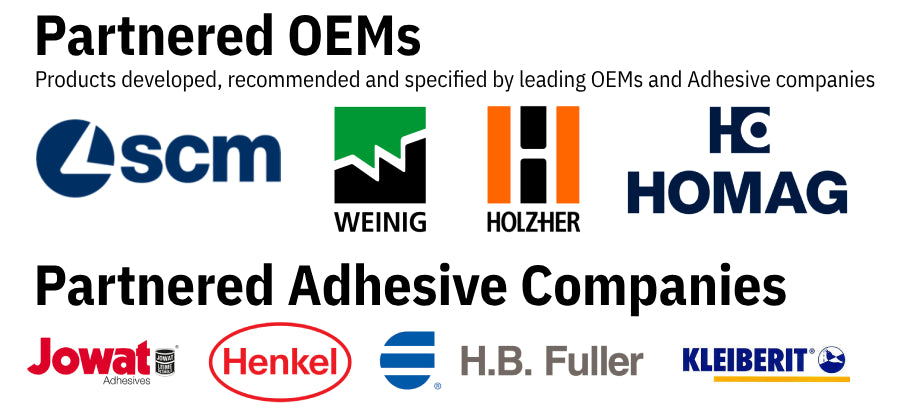ACMOS 100-2450
*This product is not eligible for expedited air shipping options.
A universal edge bander release agent which prevents the adherence of glues and adhesives used in woodworking and hot melt. Ideal for preventing glue from sticking to any parts of a hot melt or pre-glued edge bander. Its application as a spray makes it suitable for areas difficult to access, as well. It will eliminate glue sticking on clean surfaces, such as a glue pot and lubricates tools, brushes, can be used on moving parts; pressure rollers and is anti-static.
Acmos 100-2450 is recommended to be sprayed on the infeed fence, pressure rollers, copy wheels and other areas that might attract unwanted glue build up. This product is not recommended for veneer or melamine applications.
ACMOS 100-2450 Features:
- Release agent for most adhesives and glue
- Eliminates glue sticking
- Long shelf life of 36 months
- Very easy to use, suitable for hard to reach areas
- Lubricates tools, brushes and rollers
- Cleans glue pots
- Silicone-free
- Anti-static agent
*Due to the Hazardous Material classification of this product, an additional hazmat shipping fee will be applied for transport*
Application: Spray
Recommended Uses: Edge banders, handheld zigzag heating tubes (veneer stitcher), adhesive spreaders outfeed
Classified as Hazardous/Hazmat for DOT Shipping: Flammable
Available Container Sizes:
1 (Qty 12 – Sold by Case); Cases come with 12 Aerosol Spray Cans, each containing 400ml
TECHNICAL DATA SHEET:
Basis:
No substances regarded as toxic or carcinogenic according to the Regulations concerning Dangerous Substances are used in the production of ACMOS 100-2450.
Range of applications:
Ideal application (spray) also in areas not easily accessible. Apply thinly on the area to be protected. Particularly suitable for edge banding machines.
Properties:
ACMOS 100-2450 does not contain silicones or CFC propellant. Prevents the adherence of glues and adhesives and acts against dextrin adhesives, dispersion adhesives, glutin glues, phenolic, melamine, and similar resins.
Physical and chemical properties:
Form: Aerosol
Appearance: Amber
Smell: Characteristic
Density at 20°C: 0.66 g/ml ; DIN 51757
Stockage:
Storage temperature: between 10°C and 30°C
Maximum storage: approx. 36 months
Processing:
Protect from heat and cold. Allow products to reach room temperature before use. Shake well.
Why release agents are important
Release agents are critical to prevent glue and adhesives from sticking on both edgebanding machining tools and workpiece surfaces. They are developed in a liquid form and as such can be used in both automatic and manual edge processing.
Release agents are sprayed on the top and bottom of the workpiece edge areas. This prevents adhesive residue from sticking to the workpiece. Release Agents work with a variety of glues and adhesives for high-quality woods, veneers, and plastic-coated surfaces.
Advantages
Reduces production downtime due to cleaning. The process of edging can lead to unwanted glue residue on materials and equipment. Without the use of a release agent, glue residue can quickly stick and become very difficult to clean and remove. This results in a loss of production and machine downtime. Production employees are forced to spend valuable time cleaning up, instead of streamlining the manufacturing process. By using a release agent, a thin, barely visible lubricant film is formed, which prevents the adhesion of glue residues, thus avoiding time-consuming cleanup work.
Helps maintain production equipment. A common problem with edge processing is undesired glue buildup on machining tools. Glue buildup can cause unnecessary wear and tear on tools and lead to increased machine maintenance and costs. The continuous use of release agents protects the components of an edgebander, such as pressure rollers, trimming tools, hot melt adhesive tanks and buffing wheels against glue buildup. Using release agents is very important to the longevity of equipment.
Promotes high-quality finishes. Perfect, high-quality surfaces are a premium for edgebanding. During application, glue squeeze out occurs, which often creates glue lines and residue, thus affecting the quality of finished products. Release agents used during the edgebanding process prevent adhesive residues from sticking, while protecting the edge and foil from marks and friction, thus providing excellent surfaces.




